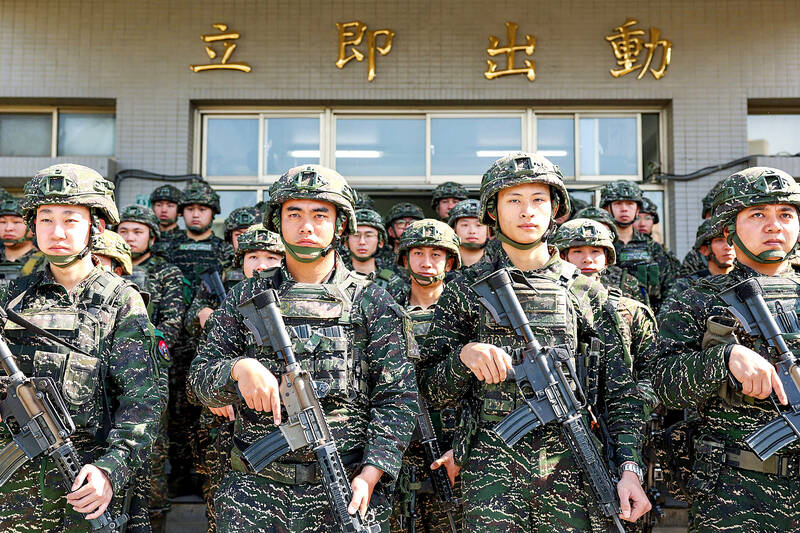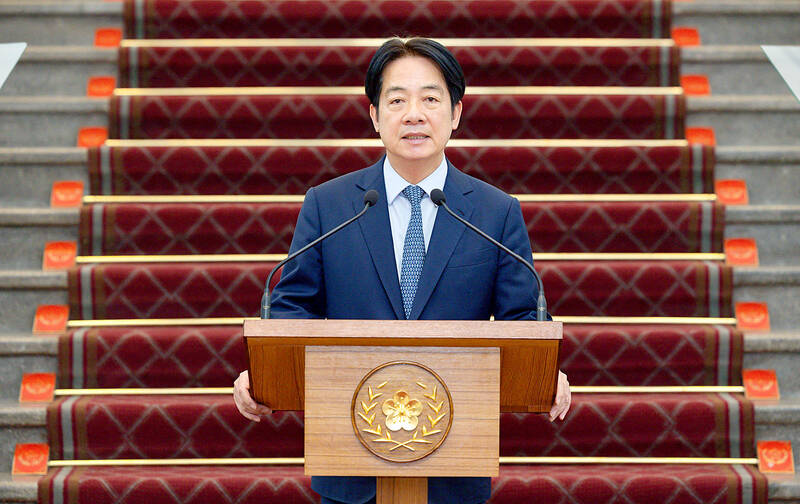President William Lai’s (賴清德) March 13 national security speech marked a turning point. He signaled that the government was finally getting serious about a whole-of-society approach to defending the nation.
The presidential office summarized his speech succinctly: “President Lai introduced 17 major strategies to respond to five major national security and united front threats Taiwan now faces: China’s threat to national sovereignty, its threats from infiltration and espionage activities targeting Taiwan’s military, its threats aimed at obscuring the national identity of the people of Taiwan, its threats from united front infiltration into Taiwanese society through cross-strait exchanges, and its threats from using ‘integrated development’ to attract Taiwanese businesspeople and youth.”
As if on cue, the very next day former director of the Chinese Nationalist Party’s (KMT) Mainland Affairs Committee Huang Ching-hsien (黃清賢) was a panelist claiming to speak on behalf of “Taiwan compatriots” at a symposium in Beijing to commemorate the 20th anniversary of the Anti-secession Law, at China’s National People’s Congress. The comments Huang made could have been taken from the Global Times, the Chinese Communist Party’s (CCP) mouthpiece.

Photo: AFP
Since Lai’s speech, announcements of specific acts and proposed plans have been coming out almost daily, signaling that the administration is actively working to make Lai’s speech a reality.
DIFFICULTIES
Only some progress was made in preparing Taiwan to defend against CCP aggression and infiltration during president Tsai Ing-wen’s (蔡英文) terms in office. Under her, military spending inched up, one-year military conscription re-introduced and the Anti-Infiltration Act (反滲透法) passed.

Photo: AFP
Unfortunately, this barely scratched the surface in dealing with the magnitude of the threat, with spies and traitors given a slap on the wrist for their crimes and little was done to prepare society as a whole.
It did not appear that Tsai fully understood that as far as the CCP is concerned they are already engaged in a whole-of-society, “unrestricted” war with Taiwan and the West, which requires a calibrated response.
Lai understands this. In June of last year, he convened a Whole-of-Society Defense Resilience (WOSR) Committee. According to the presidential office Web site: “The committee includes representatives from government agencies, industry, and civil society groups, and experts.”
The site lays out a bold, comprehensive agenda: “The committee holds discussions in five key areas: civilian force training and utilization; strategic material preparation and critical supply distribution; energy and critical infrastructure operations and maintenance; social welfare, medical care, and evacuation facility readiness; and information, transportation, and financial network protection, with the aim of strengthening resilience in national defense, economic livelihoods, disaster prevention, and democracy.”
By necessity, this is going to have to be a long-term process that extends its lifetime through different administrations.
It is going to require cooperation and coordination with local governments, but this may face pushback. Only four of the city and county governments are run by Lai’s Democratic Progressive Party (DPP).
Much legislation will need to be modified or newly created, but the opposition KMT and Taiwan People’s Party (TPP) have made it clear they intend to block most or all of it.
It will also be challenged in the courts, and so far the KMT and TPP have rejected Lai’s nominations for the Constitutional Court, which means it can’t form a quorum.
If Tsai had prioritized this in 2016, it would have been far easier. The DPP had a large majority in the legislature then and over half of the local governments. It also would have meant the process would have been well underway by now.
NO PAUSE FOR BREATH
One of the most talked about proposals is to revive military courts to handle espionage and treason cases.
The KMT has already labeled it “martial law” when it is nothing of the sort. They are planning to launch an “anti-martial law” referendum whose wording blames the government for all cross-strait tensions and implies the Ukrainians brought their misfortunes on themselves by imposing martial law to defend against a Russian invasion.
For more on those subjects and how they play into recall campaign politics, check out the March 25 “Donovan’s Deep Dives.”
Following the speech, the government also started implementing existing laws more strictly to take action.
Dramatically, the National Immigration Agency (NIA) announced they would expel and revoke the spouse-based residence permit of social media influencer Liu Zhenya (劉振亞), a national of the People’s Republic of China (PRC), whose husband is Taiwanese.
This became a major news story, including in the international media. The NIA investigated reports that Liu, under the alias Yaya in Taiwan (亞亞在台灣), advocated annexing Taiwan to the PRC through military force in videos posted on social media, including Douyin (where she has 400,000 followers), YouTube and TikTok.
This raised serious free speech discussions, but the distinction here is her calling for a violent invasion, not merely advocating for unification with China. For two excellent pieces on the subject, check out Michael Turton’s March 17 “Notes from Central Taiwan: The Yaya in Taiwan case: free speech at stake?” and the editorial on the same day “Influencer crossed the line.”
Two more Chinese influencers were also ordered to leave.
Then it was announced that more than 40 Taiwanese citizens are under investigation for allegedly holding Chinese identity cards, with 14 already notified that their Taiwanese household registrations and other documents are to be revoked.
Civil servants, including in the military, teachers, bureaucrats and even borough chiefs now have to sign a pledge that they do not hold Chinese identification cards.
China-based Taiwanese celebrities who hold Chinese residency permits or citizenship will have their citizenship revoked.
Chinese citizens and groups will be barred from visiting Taiwan if they have ties to the CCP’s United Front Work Department (UFWD).
Also relying on existing infrastructure and laws, the Ministry of the Interior is strengthening disaster preparedness efforts by expanding training for disaster response officers, aiming to reach 100,000 trained personnel by the end of the year.
Smartly, they are starting to include building managers and taxi drivers in the training, though ideally they would include stocking large apartment blocks whose underground parking garages double as air raid shelters with survival kits.
GHOSTS OF MARTIAL LAW
It likely took this long for the DPP to take this seriously because of the ghosts of the martial law era, when many of the mechanisms in place to thwart China’s “united front” tactics were also employed against the same dissidents who founded the party.
The party has also long been suspicious of the military, traditionally a KMT stronghold. The military’s Taiwan Garrison Command (臺灣警備總司令部) was especially brutal in enforcing martial law.
It is understandable why many have been allergic to anything that might even hint at going back to an era when the military was almighty and kids peeked under their beds at night for fear of commies.
The CCP has no compunctions, and should they be successful in taking Taiwan will match or exceed the brutality of the KMT’s martial law era.
The ability to resist the CCP’s ongoing war on Taiwan’s society and institutions is necessary but must include safeguarding freedoms and human rights.
It can be done.
It must be done.
Donovan’s Deep Dives is a regular column by Courtney Donovan Smith (石東文) who writes in-depth analysis on everything about Taiwan’s political scene and geopolitics. Donovan is also the central Taiwan correspondent at ICRT FM100 Radio News, co-publisher of Compass Magazine, co-founder Taiwan Report (report.tw) and former chair of the Taichung American Chamber of Commerce. Follow him on X: @donovan_smith.

Google unveiled an artificial intelligence tool Wednesday that its scientists said would help unravel the mysteries of the human genome — and could one day lead to new treatments for diseases. The deep learning model AlphaGenome was hailed by outside researchers as a “breakthrough” that would let scientists study and even simulate the roots of difficult-to-treat genetic diseases. While the first complete map of the human genome in 2003 “gave us the book of life, reading it remained a challenge,” Pushmeet Kohli, vice president of research at Google DeepMind, told journalists. “We have the text,” he said, which is a sequence of

On a harsh winter afternoon last month, 2,000 protesters marched and chanted slogans such as “CCP out” and “Korea for Koreans” in Seoul’s popular Gangnam District. Participants — mostly students — wore caps printed with the Chinese characters for “exterminate communism” (滅共) and held banners reading “Heaven will destroy the Chinese Communist Party” (天滅中共). During the march, Park Jun-young, the leader of the protest organizer “Free University,” a conservative youth movement, who was on a hunger strike, collapsed after delivering a speech in sub-zero temperatures and was later hospitalized. Several protesters shaved their heads at the end of the demonstration. A

Every now and then, even hardcore hikers like to sleep in, leave the heavy gear at home and just enjoy a relaxed half-day stroll in the mountains: no cold, no steep uphills, no pressure to walk a certain distance in a day. In the winter, the mild climate and lower elevations of the forests in Taiwan’s far south offer a number of easy escapes like this. A prime example is the river above Mudan Reservoir (牡丹水庫): with shallow water, gentle current, abundant wildlife and a complete lack of tourists, this walk is accessible to nearly everyone but still feels quite remote.

In August of 1949 American journalist Darrell Berrigan toured occupied Formosa and on Aug. 13 published “Should We Grab Formosa?” in the Saturday Evening Post. Berrigan, cataloguing the numerous horrors of corruption and looting the occupying Republic of China (ROC) was inflicting on the locals, advocated outright annexation of Taiwan by the US. He contended the islanders would welcome that. Berrigan also observed that the islanders were planning another revolt, and wrote of their “island nationalism.” The US position on Taiwan was well known there, and islanders, he said, had told him of US official statements that Taiwan had not